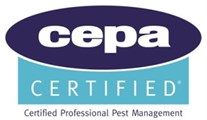At the British Pest Control Associations (BPCA) Annual General Meeting (AGM) held at Yarnfield Park Training centre in Staffordshire on 14 June it was all change at the top.
Whilst the future is uncertain, in the short term one very obvious affect is the falling exchange rate. On 27 June 2016 the pound hit a 31-year low of 1.3209 against the US dollar as UK bank and non-multinational stocks took a pummelling. Against the euro, one £ only buys you 1.20 euros. This factor alone will cause the price of petrol to rise and will make all imported pest control goods more expensive. Although the converse is true if a company is selling its products internationally.
Otherwise, as our responses below indicate, certainly in the short term, its very much ‘business as usual’.
| Industry is setting off on a roller coaster Having grown from its original exclusive UK origins, Killgerm now trades all over the globe with operating companies based in several countries, Rupert Broome, managing director, provided an excellent overview saying: “No one should underestimate the long term effects to the UK as a whole resulting from the momentous outcome of the EU Referendum on Thursday 23 June 2016, or the difficulties which will arise from the uncertainty while the UK seeks to disengage from the EU. “Although nothing is certain, from a professional pest control perspective two areas of potential change of most interest are regulatory and economic. “From a regulatory point of view, there is much to dislike about the onerous and ever changing pressures of the EU Biocidal Products Regulation (BPR). As Brexit takes shape, however, it is unlikely that this will result in a significant change in the regulatory environment for biocides in the UK. We are likely to continue to see products withdrawn from the market and changes in patterns of use for those which remain. |

Rupert Broome |
“For UK manufacturers seeking to sell their Biocidal Products in the EU, they will still need to invest significant amounts of time and money in order to comply with EU rules, in order to allow them to continue to sell their products.
“From an economic point of view, we can expect that the professional pest control industry will be influenced by the wider economic performance of the UK. If this suffers, as most forecasters appear to predict, then there is likely to be a knock on effect to service clients, which may in turn place pressure on service companies and their suppliers. The strongest and most financially secure companies in our industry will be well placed to survive these challenges, however some companies may struggle. Of course, on top of this, as a result of Brexit, sadly we may also witness the break-up of the United Kingdom itself, which would have a profound impact on our industry.
“Whichever way you look at it, the next few years will be a roller coaster, both for the UK and for our industry,” concludes Rupert.
 |
Future for servicing companies From a practical pest control servicing company point of view, Chris Turner, director at Hampshire-based Rokill Pest Control said: “The impact of Brexit will have some effect on business confidence in the short to medium term. Fortunately for the pest control industry, for many of our customers it will be business as usual. This is certainly the case where customers are experiencing pest issues, or for those clients, in particular international food companies, whose practices are already governed by exiting standards. |
“Some larger clients may delay investment decisions for discretionary capital projects, particularly if they have a wider European exposure. However, the referendum has delivered the result and it will provide different opportunities in the future, we also believe that it is important that we all remain calm and focussed because businesses are adaptable and will change to whatever challenges we are faced with.”
| Too soon for a Government response Reverting to regulatory issues, the Health & Safety Executive (HSE) was invited to comment. As to be expected at this early stage, its response was non-committal saying: “The UK Government is considering its response to the Referendum vote. HSE will continue as normal in the operation of the regulatory processes for all chemical regimes. Further details of the Government response will emerge in due course. There are no immediate consequences for how we work and regulate.” |
 |
| Where now for Rodenticide Stewardship? So, much closer to all our hearts, what is the future of the new UK Rodenticide Stewardship Regime so many people have worked so hard to establish? Is this to be consigned to the history books? Far from it, as Dr Alan Buckle, chairman of CRRU UK, explains: “CRRU UK will seek clarification in due course from the Health and Safety Executive (HSE) about the possible effects, if any, of Brexit on the UK Rodenticide Stewardship Regime. For the time being, the message is ‘business as usual’. |
 |
“Although the time-lines for authorisation of rodenticide products in UK have been set recently by the European Commission, the rodenticide stewardship regime is unique to the UK. Its requirements and operation were determined by CRRU UK in response to the concerns of HSE about the ability of professional users in this country to apply rodenticides safely.
“There is no reason to believe that any changes will occur to the regime in the short to medium term as a result of Brexit. Indeed, it is my opinion that there are unlikely to be any changes at all.”
| What about the new European standard EN:16636? So stewardship is safe, but what does the future hold for the so recently introduced European standard for pest management services, EN 16636:2015? Simon Forrester, chief executive of the British Pest Control Association (BPCA) was asked to explain. Simon said: “Before we embarked on the project to have all BPCA members audited against EN16636 by Bureau Veritas, the BPCA Executive Board had already considered what a Brexit vote would mean to CEPA Certified, and to the EN standard itself. CEPA Certified is based on EN16636, a European standard that is also a British Standard. The 35 UK companies who already have CEPA Certified can confirm their certificate states the standard to be BS EN 16636:2015. |

Simon Forrester |
“UK plc makes a huge amount of money from British Standards both at home and globally, around £8.2billion (figures from Centre for Economics and Business Research), and no government of any hue is going to throw that away – so British Standards are here to stay. Also, many clients with a presence in the UK, and across Europe, are already building CEPA Certified into their specifications, knowing that this is a unique benchmark of quality for our sector.
“By the time the dust settles on what Brexit actually means on a day-to-day basis for pest controllers and their clients, the CEPA Certified standard will be fully established. Whether in or out of Europe, the UK is leading the way in terms of certification to the standard, and with our ,embers’ help we will continue to lead the league table. CEPA Certified gives BPCA an opportunity to show all of Europe, and legislators in both Westminster and Brussels, that UK businesses work to the highest standards.”
| View from Europe Looking to Europe, Roland Higgins, director general of Confederation of European Pest Management Associations (CEPA) said: “CEPA’s vision is to ensure that the pest management industry is recognised for responsibly protecting European citizens, their homes, their food and the environment in which they live against public health risks. CEPA and its 49 members (which includes the BPCA) will continue to pursue that vision hinging it on our European Standard for Pest Management Services and CEPA Certified, its accompanying certification scheme. |
 |
“Less than a year after its launch more than 110 pest management companies in 21 European countries have already been distinguished with a third party audit certificate against our Standard. The British public’s vote in favour of leaving the European Union will not affect CEPA’s determination, nor that of its members, including the British Pest Control Association, to maintain the present course of using our European Standard and its certification programme to communicate to stakeholders and the public that our industry works to the highest professional standards,” concludes Roland.
| Professional standards must be maintained Picking-up on these international standards, Anne Godfrey, chief executive of the Chartered Institute of Environmental Health (CIEH), said: “We appreciate that much of the regulatory framework our members work with has its roots in the EU, but we equally recognise that the standards environmental health professionals uphold on a daily basis are applicable worldwide. “Our priority now is to work with the various national regulators, our members and the wider profession to ensure that standards of public health and public protection are maintained during the transition period and beyond. We have the utmost confidence in the ability of environmental health professionals to continue to work with business and individuals to deliver the service that the country wants and needs.” |

Anne Godfrey |
Save up your holiday money!
So readers, not much is going to change in the short term – its business as usual for UK Pest Control plc.
However, if you are about to leave all those wasps’ nests behind you to sun yourself abroad, those beers have now become quite a bit more expensive!

